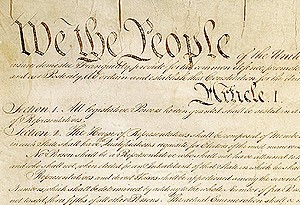Today we celebrate the signing of the United States Constitution of 1787 by the men we call the Founders. In commemorating their achievement on that September day, we honor them not just for drafting the first version of our Constitution but for their understanding that it would be a living document. As James Madison declared during the Constitutional Convention: "In framing a system which we wish to last for ages, we should not lose sight of the changes that ages will produce."
Change occurred immediately. In the first Congress, Madison, the father of the Constitution of 1787, became the parent of its most prominent offspring: the Bill of Rights. Historian Joseph Ellis rightly calls it “the American Magna Carta.” Yet, as the Founders anticipated, many, many changes to the Constitution followed, produced by many, many parents. Some came through additional amendments, others through judicial decisions, and still others through mass movements; but all came through struggle and determination.
Together, litigation, amendments, and popular action have produced the Constitution and the constitutional rights that we inherit. And so, we can also celebrate the Founders today by recognizing that their greatest achievement was not drafting a document that solved all of the problems facing them or that have faced subsequent generations. But rather, their prime triumph was the creation of a changeable constitution that has continued to frame how fights over such problems should be fought in a representative democracy.
One way we can take this day to celebrate that fundamental accomplishment is for each of us to think about how the Constitution has evolved, and the changes to the Constitution we cherish the most. Besides the Bill of Rights, high on my list are:
- The Thirteenth Amendment and its abolition of slavery.
- The Fourteenth Amendment and its renewed promise of equality under the law.
- The Nineteenth Amendment empowering women to vote.
- Brown v. Board of Education and its promise of racial equality.
- Brandenburg v. Ohio with its vindication of the ACLU’s long fight against laws punishing political advocacy.
- The Twenty-sixth Amendment extending voting rights to those eighteen and older.
- Lawrence v. Texas and Obergefell v. Hodges recognizing the sexual and marital rights of LGBTQ Americans.
All of these constitutional changes and countless others have passed down to us through generations of struggle, framed by succeeding versions of the Constitution. Some, like these, I cherish; others, I resist and try to change.
Today gives you a moment to think about what changes to this living document you cherish the most, and what changes to it you think are needed now. As we all do so, we the people honor the Founders on Constitution Day as they should be commemorated. Not by reverence, but by recommitting ourselves to making the Constitution realize their highest aspiration and that of succeeding generations into our own: A More Perfect Union.

